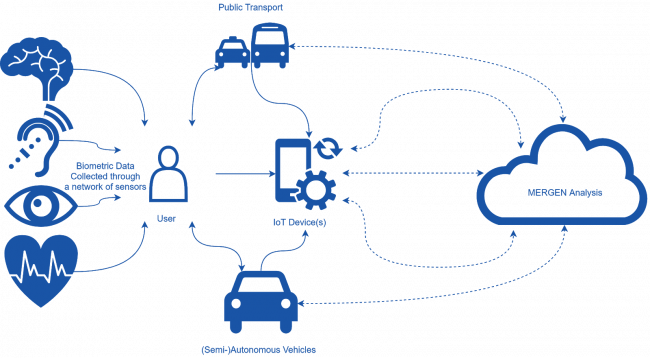SAFER Seminar: Physiological measurement methods
The seminar week 37 will focus on how physiological measurement methods can be used in traffic safety research. Christer Ahlström, VTI, and Robin Palmberg, KTH, will present their latest research on this topic.
*******
Personalised algorithms for driver sleepiness detection
Speaker: Christer Ahlström, PhD, Associate professor and Researcher: Human Factors in the Transport System, VTI
Sleepiness and fatigue are estimated to be a contributing factor in about 20% of crashes. Fatigue especially occurs on monotonous roads, after too many hours behind the wheel, during night-time, or when we haven’t slept enough. Fatigue caused by underload is also bound to occur more often as more and more driving tasks are automated.
In recent years, a lot of research has been invested in the development of automatic fatigue detection systems. Some of the systems make use of driving behaviour such as lane keeping performance, behavioural information such as yawning and eye aperture, or physiological data such as heart rate and brain activity. For now, none of the systems appear to be ideal. But what can we do to make fatigue detection systems more robust? One idea is to use personalised algorithms, and the topic of this presentation is to illustrate how much we can gain by using personalized instead of generic algorithms. An indicative number, according to our tests, is a performance increase of about 20%. The disadvantage of personalised algorithms is reduced applicability since the models must be adapted to each driver, but perhaps this is the price we must pay to reach acceptable levels of accuracy.
MERGEN - Cognitive load as a factor of safety for drivers
Speaker: Robin Palmberg, PhD student, KTH Royal Institute of Technology
As we are moving toward a future with new methods for operating vehicles, both at the location and from a distance, there are concerns raised in the impact of these methods on the cognitive capabilities of a driver. Will a driver stay as engaged when distancing oneself from the vehicles as they would be while driving the vehicle situated behind the physical steering wheel? In order to uncover the differences in impact between operation methods and scenarios, we are designing a method for measuring and determining cognitive load based on physiological data deducted from brainwave activity, heart rate variability and more.
Currently, the levels and effects of different types of the cognitive load that will affect driving have been theoretically defined and with the use of an in-house produced research concept vehicle (RCV-E) pilots are being performed to uncover the possibilities to measure and distinguish these types of the load while finding the factors which might affect each type. While performing these pilots, it is also explored which is the least amount of data needed in order to safely monitor and extract the driver fitness based on their cognitive load.
Due to circumstances concerning Covid-19, all SAFER Thursday seminars will be held exclusively online, via Teams, until further notice. We hope that many of you will join, it is important that we continue to work together to save lives in traffic! For obvious reasons no lunch will be served. If you want to join we kindly ask you to register below anyway, this will make it easier for us to plan accordingly.
How to register your attendance, please note that the event is for SAFER partners only:
Register https://fm.webforum.com/safer/form.asp?sid=972379912 no later than 16.00 on Wednesday, September 9, 2020.
Not all super heros wear capes, but all cancel their booking if they change plans.

